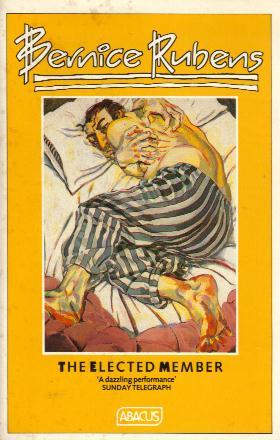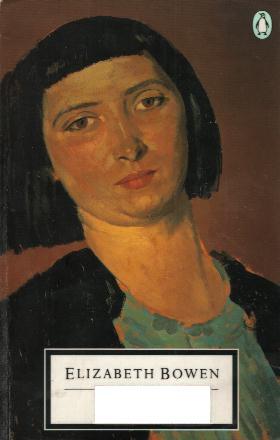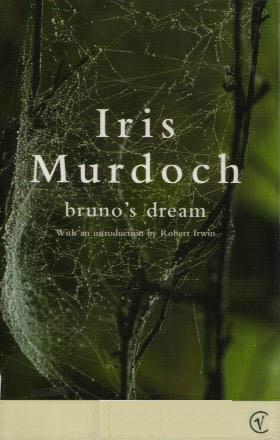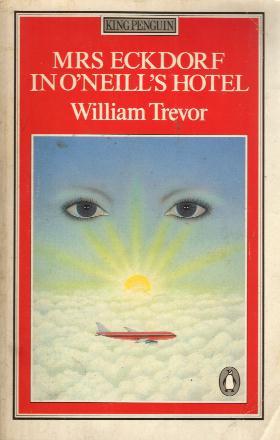
Bernice Rubens
The following novels constitute the shortlist for the 1970 Booker Prize:
Notable Omissions from the 1970 Shortlist

|
The Elected Member Bernice Rubens |
Dustjacket synopsis:
"Norman is the clever one of a close-knit Jewish family in the East End of London. Infant prodigy; brilliant
barrister; the apple of his parent's eyes...until at forty-one he becomes a drug addict, confined to his bedroom, at the
mercy of his hallucinations and paranoia.
"For Norman, his committal to a mental hospital represents the ultimate act of betrayal. For Rabbi Zweck, Norman's father, his son's deterioration is a bitter reminder of his own guilt and failure. Only Bella, the unmarried sister, still in her childhood white ankle socks, can reach across the abyss of pain to bring father and son the elusive peace which they both desparately crave."
Quotes:
"A dazzling performance " - Sunday Telegraph
First Paragraph:
Norman Zweck dared not open his eyes. He turned over on his stomach, raised his knee high, stiffening straight the other leg. He slipped his toe into the division of the two mattresses, savouring the chill of the other side, the inherited side. Once it had been his parents' bed, a vast seven-footer, mahogany-joined at both ends for form's sake, but divided in the middle for all practical purposes. Together but divided, they had lain for the forty-five years of their marriage. When his mother had died, two years before, she had, on that very bed, but on the other side, bequeathed it to him. His father had gladly taken over his son's single bedroom, while Norman lay chained to his inheritance. Occasionally, he had slipped over to his cold legacy during his fitful sleeps. But nightmares awaited him on that side, and terrible wakenings. He edged over for safety to his father's side, stiffening again his one leg, and embedding his other foot into the dividing line, and without touching his body, he felt the feel of it. A young boy, he thought, would have felt the same sensation in the youthful stretch of the leg, and the relaxed hollow between the shoulder blades. So he did not touch the folds on his stomach, or the veined stretches of his groin. These were intellectualised realities, and had nothing to do with the teen-age lay-out of his body. He slipped his hand underneath the pillow, grazing his stubbled cheek. He smiled sadly at this undeniable touch of age, and to confirm it, grasped with his calloused hands, the wrinkled folds of his flesh. He gathered them up, one by one, the muscle-less wads on his belly, his chin and his thighs, twisting and turning them, obsessed by their feel of years. He returned to his original lay-out, but now he knew it for a fraud. The folds and wrinkles on his skin, were notches, each one, for each of his forty-one years.
From the Abacus paperback edition, 1983.

|
John Brown's Body A.L. Barker |
Dustjacket Synopsis:
"Marise Tomelty is a child-wife who dislikes sex and is terrified of open spaces. Ralph Shilling lives in the flat above
the Tomeltys' and is a dealer in pesticides. Marise's commercial traveller husband casually mentions that he recognizes
Ralph as John Brown, the suspect acquitted for lack of eidence in an atrocious double murder. Nevertheless, Marise
encourages Ralph's attentions, in need of the exciting combination of passion and fear.
"Shortlisted for the 1970 Booker Prize, John Brown's Body is a serious exploration of the nature of our experience of ourselves and each other, of the tug between body and soul, life and death, truth and fantasy - an extraordinary novel written in precise, impeccable prose for which A.L. Barker is famed."
Quotes:
"It is an extraordinary novel" - A.S. Byatt
"She is formidable, and from a bare corner of human relations gathers a rich harvest" - Adam Mars-Jones
First Paragraph:
Marise saw at once that this place was far behind Plummer Court. It had had years of people living over it and their rubbing and breathing had turned it grey. The carpet and the curtains and even the bunch of lilac she had brought in with her were grey, the colour of other people's air wa sbathwater.
Her habit was to case anywhere new for the harm or benefit she could expect and she saw that she would be the loser here. She could not open her mouth without tasting the tall rooms and the plaster cornices and the swaybacked couch which smelt like a lion.
She saw herself running beautifully away under flamboyant trees, her hair jumping on her shoulders, silkily springing and falling. People turning to look drank her up with their eyes, she was an arrow flying from the fire to the sun.
From the Virago Modern Classics paperback edition, 1999.

|
Eva Trout Elizabeth Bowen |
Dustjacket synopsis:
"Monolithic, rich, unloved and with a genius for unreality, Eva Trout has a 'capacity for making trouble, attracting
trouble, strewing trouble around her' that is endless.
"Eva Trout was Elizabeth Bowen's last completed novel. And here her elegant style, her gift for social comedy and her intense sensibility combine to create one of her most formidable - and moving - heroines."
Quotes:
"Miss Bowen is magnificent when she writes about conspiracy, duplicity and ambiguity, and her achievement...is extremely
impressive" - Margaret Drabble
"A subtle elusive novel making its mysterious way forward by side glances and half-gleams, by sudden small illuminations,
and half-hidden ironies, by a tenderness that is half-mocking and a mockery that is half-tender" - Richard Lister,
Evening Standard
"Resonant, beautiful and often very funny...Eva is triumphantly real, a creation of great imaginative tenderness" - Julian
Jebb, Financial Times
First Paragraph:
'This is where we were to have spent the honeymoon,' Eva Trout said, suddenly, pointing across the water. She had pulled up the car on a grass track running along the edge of a small lake. She switched off the engine - evidently, they were to gaze at the castle for some time.
Her carload of passengers was dumbfounded. Nothing of this had been mentioned before. The four Dancey children, packed in the back seat, climbed over one another to see better (the view was framed by the jaguar's left-hand windows). Of their mother, in front beside Eva, more seemed required - Mrs Dancey, wildly craning her neck, brought out: 'Not in winter, I hope?'
'No - spring. There would have been daffodils.'
The castle, mirrored into the sheet of probably artificial water, did not look ancient. Nor did it look indigenous: though its setting was English, the pile resembled some Bavarian fantasy. Light-coloured, standing straight up out of the lake (there was no terrace) the facade showed with photographic distinctness in the now fading January afternoon. Its windows, many of which were balconied, one and all were made sightless by white shutters. Above the turreted roofline rose steep woods, sepia with winter: no smoke from any contorted chimney blurred the transparency of the trees. The only movement was in the foreground, where swans rippled the image cast on the water by zigzagging absently to and fro.
From the Penguin paperback edition, 1982.

|
Bruno's Dream Iris Murdoch |
Dustjacket synopsis:
"Bruno is nearly ninety. Obsessed with his past and a passion for spiders, he is still centre of a complex web of
relationships. Caught up in the web are Danby, Bruno's hapless son-in-law; Danby's mistress, Adelaide, and her twin
cousins: Will, bent on avenging Adelaide's seduction, and mischievous, sinister Nigel.
"The web's stands are further entangled when Bruno insists on seeing his long-estranged son, Miles, who lives with his wife and sister-in-law. Soon the uneasiness long smouldering below the surface erupts into passion and violence."
Quotes:
"She is incapable of writing without fascinating and beautiful colour" - The Times
First Paragraph:
Bruno was waking up. The room seemed to be dark. He held his breath, testing the quality of the darkness, wondering if it was night or day, morning or afternoon. If it was night that was bad and might be terrible. Afternoon could be terrible too if he woke up too early. The drama of sleeping and waking had become preoccupying and fearful now that consciousness itself could be so heavy a burden. One had to be cunning. He never let himself doze in the mornings for fear of not being able to fall asleep after lunch. The television had been banished with its false sadnesses and its images of war. Perhaps he had nodded off over his book. He had had that dream again, about Janie and Maureen and the hatpin. He felt about him and began to push himself up a little on his pillows, his stockinged feet scrabbling inside the metal cage which lifted the weight of the blankets off them. Tight bed clothes are a major cause of bad feet. Not that Bruno's feet minded much at this stage.
It was not night, thank God. The cowering mind and body fidgeted, discovering themselves in time. He remembered, or somehow knew, that it was the afternoon. The curtains were tightly pulled, but there was a cold reddish glow about the edges. The sun must be shining out there, the chilly spring sun, casting a graceless light upon sinful London and the flooding Thames and the grimy ringed towers of Lots Road power station which would be visible from the window when Adelaide came at five o'clock to pull the curtains. He reached for his glasses and held his watch up towards the dim curtain-edge and made out that it was four fifteen. He wondered if he should call out to Adelaide but decided not to. He could manage three quarters of an hour without the horrors. And Adelaide was a rather irritable servant who disliked a premature summons. Or perhaps she had become irritable only in the last year. Did she smash the best plates on purpose? There were always crumbs on the tray. He was so old now and he had been ill so tediously long.
From the Vintage paperback edition, 2000.

|
Mrs Eckdorf in O'Neill's Hotel William Trevor |
Dustjacket synopsis:
"What was the tragedy that turned O'Neill's Hotel from a plush and prosperous establishment into a dingy
house of disrepute? Ivy Eckdorf is determined to find out. A professional photographer, brash and hard by
admission, she has come to Dublin convinced that a tragic and beautiful tale lurks behind the facade of this crumbling
bordello.
"Mrs Eckdorf's unprincipled probings take her deep into the secret lives of O'Neill's assorted satellites: a deaf-and-dumb old woman whose silence invites the confidences of all around her; her feckless son, drowning in sherry and dreams; a lonely pimp given to desperate deceptions. Yet it is Mrs Eckdorf alone who is the victim of the truth she seeks to exploit, for the elusive mystery of O'Neill's Hotel turns out to be her own.
"Humour and pathos are superbly blended in this delightful novel; it is one of William Trevor's finest books."
First Paragraph:
'I'm Ivy Eckdorf,' said Mrs Eckdorf as the aeroplane rose, from the ground. 'How d'you do?'
The person beside her, a stoutly made red-checked English-man who happened at the titne to be reading of unrest in Syria, lowered his evening newspaper and smiled at Mrs Eckdorf. He did not give his name, since he saw no cause to barter names with a stranger on an air-flight. He displayed further goodwill by nodding. He lifted his newspaper again.
'Now what are we going to take to drink?' said Mrs Eckdorf. She reached above her and turned on the little orange light that indicated a desire for attention. 'I loathe being up in the sky,' she confessed. 'Especially at night. Cognac for me,' she said when the hostess came. 'Now what for you, my dear?'
Amazed that he should be so addressed by a woman he did not know and thinking that he was clearly going to have to pay for her drink, the man asked for whisky. He glanced at Mrs Eckdorf and saw the face of a woman in her late forties, with blonde hair hanging from beneath a cream-coloured hat with a brim. She had eyes of so pale a shade of brown that they were almost yellow, and two reddened lips that were generously full and now were parted in a smile. There was a gap between her teeth, precisely in the centre of this mouth, a slight gap that an ice-cream wafer might just have passed through.
From the King Penguin paperback edition, 1982.
|
The Conjunction T. Wheeler |
Novel synopsis:
Note:
I have not seen a copy of this book.
Notable Omissions from the Shortlist:
"Fifth Business", Robertson Davies
"A Fairly Honuorable Defeat", Iris Murdoch
"Fireflies", Shiva Naipaul
This page and its contents are copyright © 2002-05 by Perry Middlemiss, Melbourne, Victoria, Australia.
Last modified: December 5, 2005.